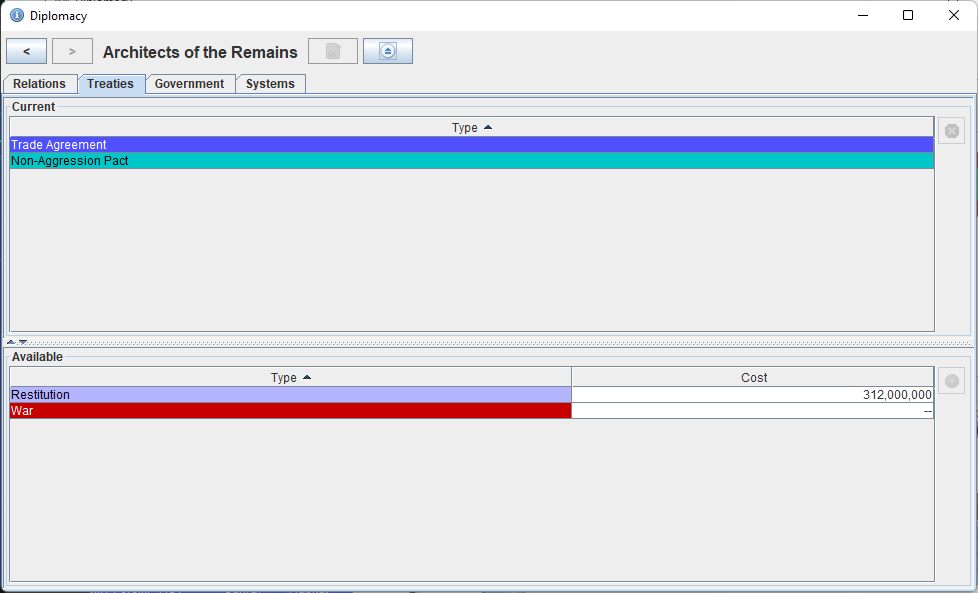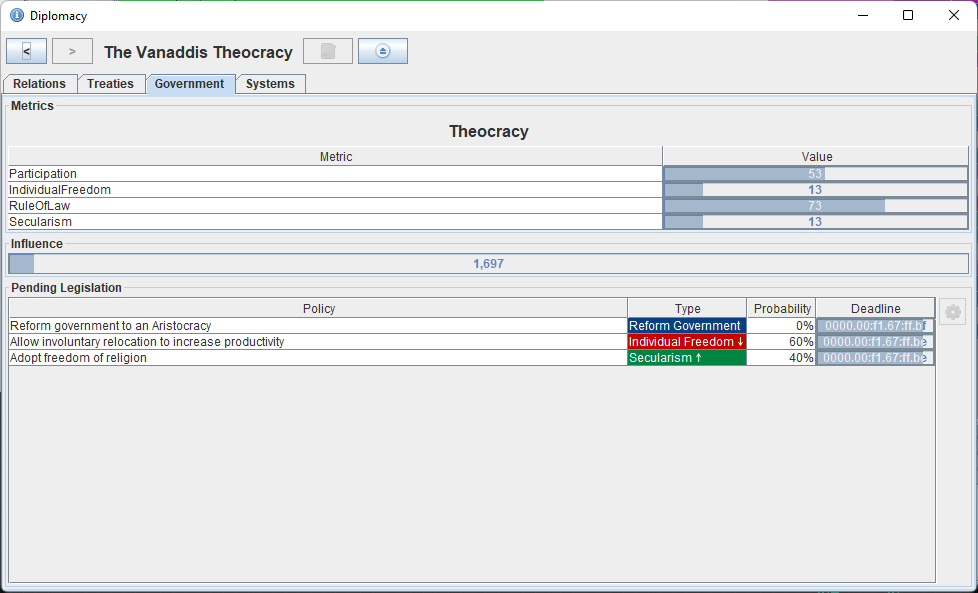Diplomacy Window
The diplomacy window holds all information relating to your relations with another faction. It can opened either clicking the chat ![]() icon on a fleet owned by that faction, or from the Diplomacy tab in the faction window.
icon on a fleet owned by that faction, or from the Diplomacy tab in the faction window.
Relations
The Relations tab shows detail on what is affecting the faction’s current opinion of you, and any allies and enemies the faction has. Many opinion modifiers are transient and revert to zero over time

Treaties
The Treaties tab is used to manage treaties with this faction. Active treaties are shown in the top part, while available treaties are shown below. A treaty can be enacted by selecting it in the lower panel and clicking the add ![]() icon.
icon.
The available treaties are affected by the faction’s underlying willingness to cooperate, together with its current opinion of you. Some closed societies may never make certain treaties available to you even where they have the highest possible opinion of you. Some treaties such as Restiution have a cost (in Drams) associated with them that must be paid to enact the treaty.

The types of treaty available are given below.
- [Armistice] a cessation of hostilities between your factions.
- [Cultural Exchange] sharing ideas, values and traditions that can lead to increased relations.
- [Restitution] payment for past violations that will immediately remove related negative opinions.
- [Trade Agreement] permission to buy/sell resources via the markets of the faction.
- [Non-Aggression Pact] a neutrality pact to avoid military action between the two factions.
- [War] a declaration of war on the faction.
Government
The Government tab shows the current form of government, and various metrics that indicate government tendencies.
- [Participation] the degree to which citizens participate individually and directly in political decisions and policies that affect their lives. Low participation implies Rule by Few such as an Autocracy whereas high participation implies Rule by Many, such as a Democracy.
- [Individual Freedom] the degree to which citizens are free to express themselves, such as freedom of speech, rights to assemble.
- [Rule of Law] the degree to which citizens are treated equally by the legal system. Low rule of law would imply that arbitrary detentions occur with no right to trial and defacto immunity from prosecution for the ruling elite. High rule of law would imply an independent judiciary, presumption of innocence and the law applied equally to all.
- [Secularism] is the degree to which the state functions independently from religious concerns. Low secularism implies power is held by the clergy with other religions suppressed and forced conversion being legal. Mid-secularism implies general freedom of religion but a separation from the legislature. High secularism becomes distinctly anti-religious.

Influence with a faction is gained by having positive relations. The amount of influence gained is determined by the amount of positive opinion the faction has of you, and of the relative power of their faction versus yours. Powerful factions are more difficult to build influence with.
Governments periodically introduce legislation which will affect the government metrics, or even reform the government to a wholly different type. Influence can be spent to shift the probability of the legislation passing. Each form of government has particular range preferences for each of the government metrics, and will resist attempts to influence legislation that go against its innate preferences. Details of the different government types and metrics can be found in the Governments appendix.
Systems
The Systems tab shows the faction’s sovereign systems that you have discovered, along with anything remarkable about them.

